
The Business of Fashion
Agenda-setting intelligence, analysis and advice for the global fashion community.

Agenda-setting intelligence, analysis and advice for the global fashion community.
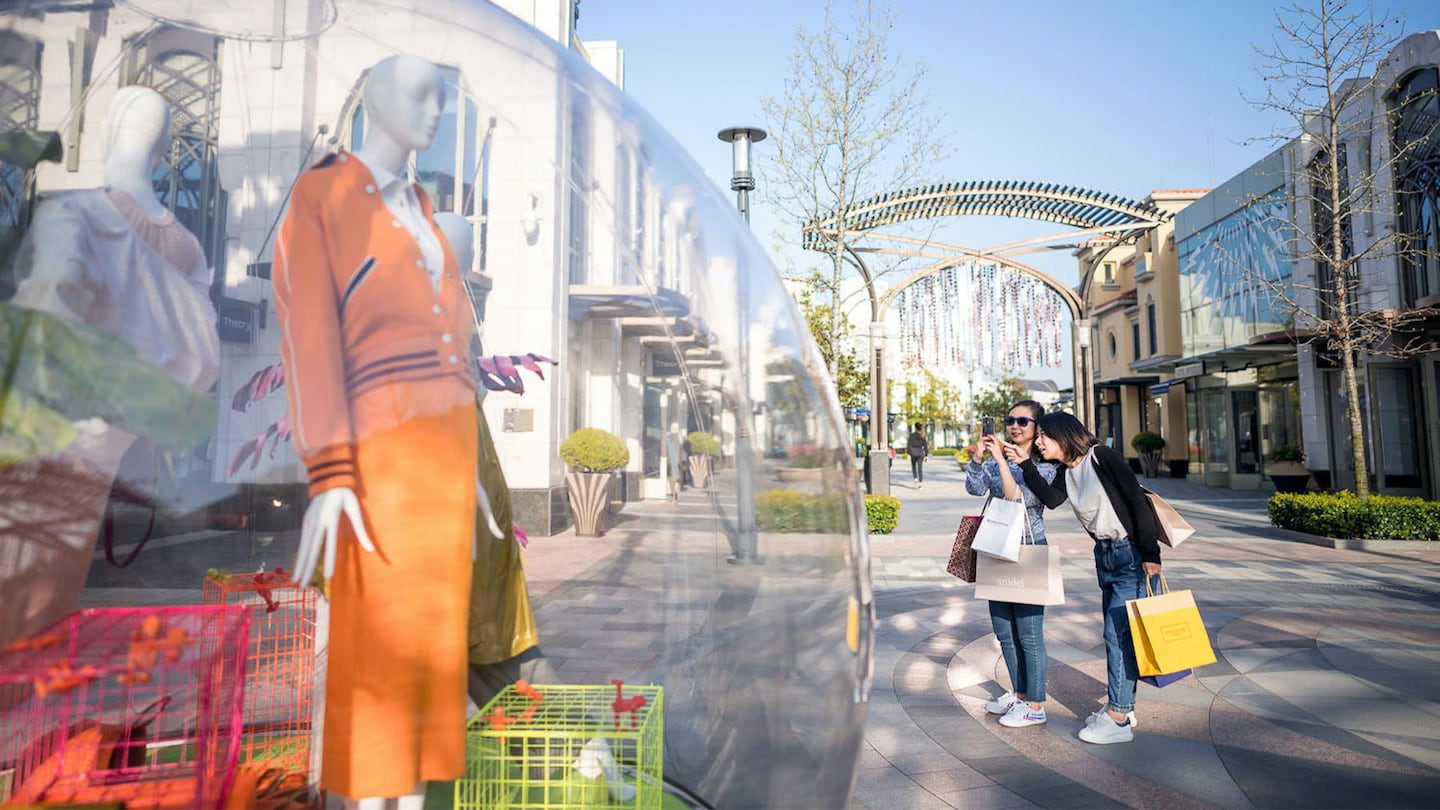
Before the pandemic, discount shopping hubs like the UK’s Bicester Village and McArthurGlen Serravalle in Italy were major draws for China’s more than 150 million annual international travellers. But stuck on the mainland over the last 18 months, many of those shoppers have started discovering outlet malls on their own turf.
The number of outlets where sales surpassed one billion yuan ($154.9 million) rose to 39 last year, up from 34 in 2019, according to data from Chinese outlet mall industry publication, outletscn.com. The most successful players, including Shanghai’s Bailian Outlets Plaza, Beijing’s Capital Outlets and Florentia Village’s outpost between Beijing and Tianjin, enjoyed sales of more than half a billion dollars each last year.
That’s in contrast to the sector’s performance in countries like the UK, France and Italy, where sales were lost due to a lack of international travellers, as well as retail closures. Rental revenue also fell significantly as many operators offered rent relief to tenants as shops were shuttered.
As countries began re-opening, footfall at outlet malls (whilst generally outperforming that of indoor malls) remained below pre-pandemic levels. Market research firm Placer.ai conducted research in the US in August 2020 that found average year-over-year visits to outlet malls had declined 26.9 percent.
ADVERTISEMENT
On the other hand, Value Retail, which owns The Bicester Village Shopping Collection, a group of 11 luxury discount outlets in the UK, continental Europe and China, told BoF first-half sales at its two China properties handily surpassed 2019 levels this year. It declined to say how this compares to its sales outside of its China villages. Sales at its Shanghai property more than doubled compared to the same period pre-pandemic, while its Suzhou Village saw sales grow by 80 percent. More than three quarters of customers over this period were first-time visitors to its mainland properties, the company said.
China in many ways is defining the future of our business.
And consumers aren’t coming just for the discounts, Value Retail founder and chairman Scott Malkin said. In a pandemic-era experiment, the group has allowed its high-end luxury brands to use 10 percent of outlet floor space for popular in-season products. These full-price items accounted for as much as 30 percent of revenue for some boutiques, Malkin said.
The “business in China in many ways is defining the future of our business,” he said. “In the past 18 months we’ve pivoted and done almost a billion dollars in new business from activities we didn’t have before.”
Another feature the company is planning to roll out after first testing it in the Chinese market are regular events for VIPs. Hundreds are planned globally this year across Value Retail’s properties. It’s a change from 2019, when Malkin said VIP events existed, but “not in this kind of organised way.”
The domestic outlet sector is also comparatively resilient to ongoing concerns over Covid-19 because it is driven by a largely local consumer base, said Daniel Zipser, senior partner and head of McKinsey & Company’s consumer and retail practice in Greater China. While a new outbreak of the Delta variant in China has led to the reintroduction of lockdown restrictions in some cities, barring a total lockdown, sales are likely to remain resilient or even benefit from travel restrictions.
“Local outbreaks mean many families are likely to stay close to home looking for staycations and day trips which could potentially play to the advantage of outlet malls,” said James Macdonald, senior director of real estate firm Savills Research, China.
Whether or not China’s outlet malls see their growth spurt stunted by Covid-19 in the short-term, existing trends and new habits being developed by Chinese consumers bode well for the segment in the long run.
Poised for Growth
ADVERTISEMENT
Only a decade ago, it was rare to see outlet malls in China at all. The country’s shopping mall boom was just getting underway in earnest, with sparkling air-conditioned palaces of commerce going up all over the country. At the same time, a growing population of Chinese travellers, eager to spend on luxury items that generally sold at a lower price point in Europe, also discovered international outlet malls. Received wisdom held that these havens of discount shopping would not hold the same allure to Chinese consumers in China.
After all, it’s inherently difficult to recapture the experience of European-style destination shopping in the suburbs of a Chinese city. Luring people away from the air-conditioned comfort of a growing number of inner-city malls, without the brands or assortment that could be found in overseas outlet malls seemed a tough ask.
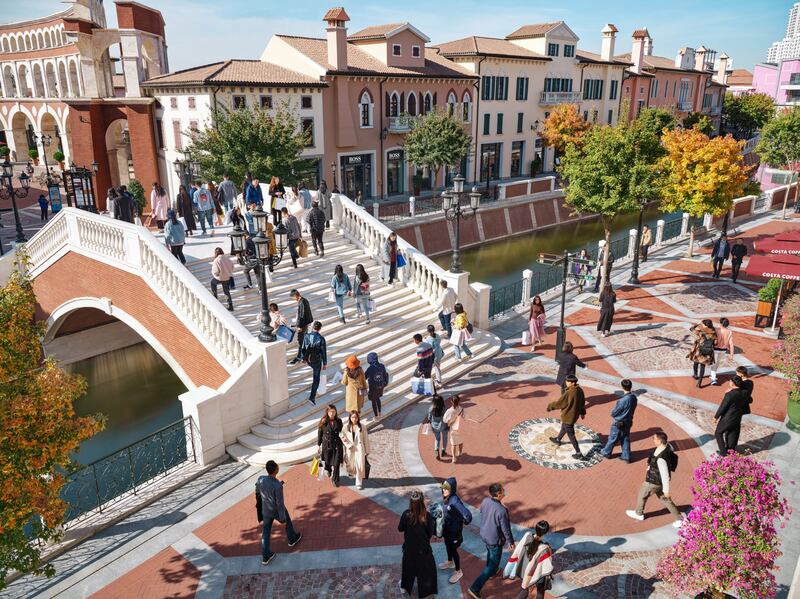
Into this unchartered environment stepped Fingen Group, an Italian retail and real estate group that already operated five outlet malls in its home country in partnership with outlet specialists, McArthurGlen. RDM Asia, a real estate arm of Fingen Group, opened Florentia Village, an outlet mall situated between Beijing and Tianjin, China’s first real European-style outlet mall. After ten years operating in China, the group now has seven outlets in cities across the country, enticing shoppers with a “European experience” via outdoor malls complete with plazas, fountains and classic Italian architectural cues.
The number of outlet malls in the country doubled between 2017 and 2019 to hit 110 nationwide, according to research from real estate firm CBRE. Sales in the sector tripled between 2012 and 2016, outpacing overall growth in physical retail sales in the country, according to investment brokerage firm CGS-CIMB.
The space is also attracting fresh investment. RDM Asia has raised $200 million from international investors for a vehicle, called Silk Road 2, which will invest in the opening of several new centres in China. It’s also working on two new acquisitions, one of which is an existing outlet it plans to convert into a Florentia Village outlet, president Jacopo Mazzei said. A recent extension to Florentia Village Shanghai added nearly 300,000 square feet of space and 150 stores. Mazzei estimates Florentia Village outlet malls are on track to reach $2 billion in revenue this year, compared with $1.2 billion in 2019.
The number of outlet malls in the country doubled between 2017 and 2019 to hit 110 nationwide.
Locally grown, domestic retail groups are also muscling in on the market. Sasseur Group, founded by Chongqing-born entrepreneur, Xu Rongcan (also known as Vito Xu), has 11 malls around China and a real estate investment trust that listed on Singapore’s stock exchange in 2018. According to interviews with local media outlets, Xu is currently on the lookout for underperforming shopping centres that could be converted to outlets in the near future.
Beyond the Pandemic
According to Savills’ James MacDonald, there is likely to be some shift back to shopping at designer outlets overseas once international travel resumes, but it’s “unlikely to be to previous levels.” New shopping behaviours forged during the pandemic are also finding longer-term support from factors like the increased convenience of domestic travel in China; a narrowing price differential for luxury products between China and elsewhere; an expanded range of products; brands participating in China’s outlet scene; and government schemes to encourage domestic consumption.
ADVERTISEMENT
With the market poised for continued strength, mall operators are jostling to carve out areas of competitive advantage that will keep them ahead in the domestic market and allow them to retain their appeal as travel opens back up.
One area where many are looking to invest is digital innovation. Online sales channels are particularly important in China, which is tipped to become the first country to see more retail sales completed online than offline this year. Florentia Village is aiming to reach online sales of $150 million in three years, RDM Retail’s Mazzei said.
The future of retail is digital; the war is over. But the future of fashion and brands is still physical.
Value Retail is taking a different approach, focusing more on virtual selling than traditional e-commerce. It’s set up a concierge service via WeChat to show and sell products via direct personal messages between a sales associate and client.
“It’s very clear, the future of retail is digital; the war is over. But the future of fashion and brands is [still] physical,” Value Retail’s Malkin said. “Our approach, instead of Alibaba and JD.com, it’s WeChat and a concierge, it’s personalised.”
As with so much else, Malkin says the evolution of China’s outlet mall sector has been heavily influenced by this unique pandemic period, though the foundations of its current trajectory existed long before Covid-19.
“I think Value Retail’s business was going to embrace these kinds of changes anyway,” he said. “But the pandemic served as an accelerant, it served as a catalyst.”
时尚与美容
FASHION & BEAUTY

Shein Halts Indonesia Sales, New Report Scrutinises Supply Chain Claims
The Chinese ultra-fast fashion giant has stopped shipments to Indonesia, according to a notice on its Indonesian website. Despite the company becoming the largest fast fashion retailer in the US this year, Shein has not acquired the same foothold in Southeast Asia. Elsewhere, a Reuters report found the company has not made public disclosures about working conditions along its supply chain that are required by law in the UK. The report also alleged the company made false claims that conditions in the factories it uses were certified by international labour standards bodies. The company said it is in the process of finalising statements required by UK law. (Reuters)
Ex-Condé Nast China Publisher to Launch Attitude Magazine China
Paco Tang, the former group publisher at Condé Nast China, has formed a new publishing house called Xicun Media, in conjunction with the former deputy editor of Condé Nast Traveller China and others. Its first project will be to bring Attitude Magazine, the UK and Europe’s top LGBTQI title, to China, according to local media reports. The China edition of the magazine will be a publication focused on “diversity” rather than overtly positioning the title as LGBTQI-centric, according to Xicun Media. LGBTQI content is still regularly censored across China’s social media platforms. (BoF)
Shiseido Launches Beauty Innovations Fund in China
The beauty company’s China subsidiary is partnering with asset management firm Boyu Capital to seek out investment opportunities in emerging cosmetics and wellness brands, as well as related technology companies like e-commerce services. The fund is scheduled to start operating this year, after the completion of relevant regulatory filings in China. Boyu and Shiseido will jointly manage the fund. (BoF)
科技与创新
TECH & INNOVATION
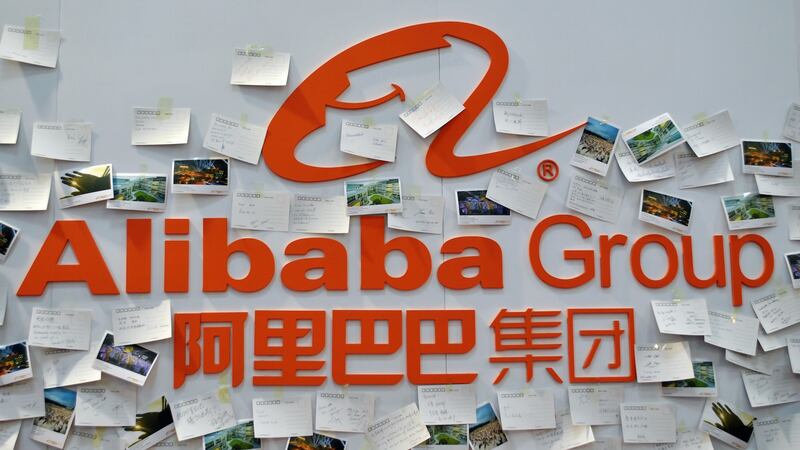
Alibaba Fires Manager Accused of Sexually Assaulting Employee
The Chinese e-commerce giant is scrambling to address allegations by a female staffer who posted an account on the company’s intranet over the weekend accusing her supervisor and a client of sexually assaulting her. The accused manager was fired and a number of executives have resigned, chief executive David Zhang said in an internal memo reviewed by Reuters and later made public. Investigations into other individuals referred to in the victim’s account are ongoing, Zhang said. The company committed to implement new policies to prevent sexual harassment in the workplace. (Reuters)
消费与零售
CONSUMER & RETAIL
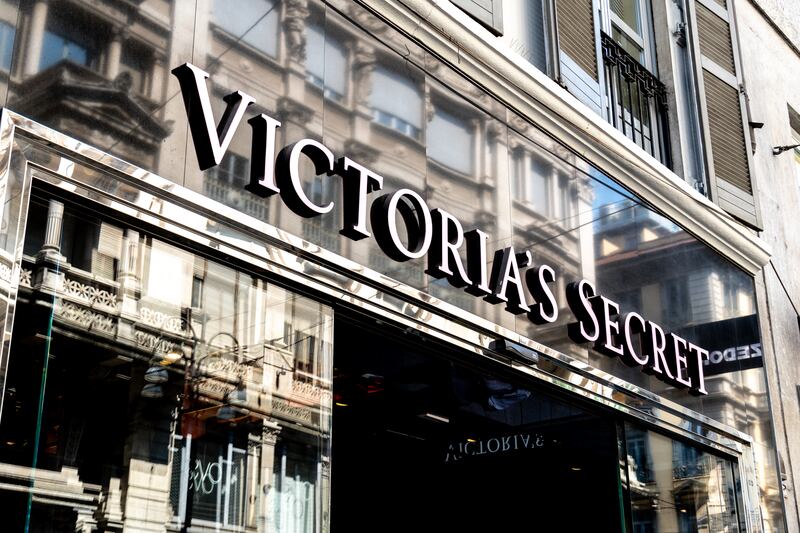
Victoria’s Secret Opens Duty Free Store in Hainan
The lingerie company is looking to tap into China’s duty-free boom with its first store in Hainan’s duty-free shopping complex in downtown Sanya. Chinese consumers unable to travel abroad during the pandemic have fuelled a surge in domestic duty-free sales. (Retail in Asia)
First Uniqlo Global Flagship Store in Beijing to Open in November
The apparel retailer’s new store will be the company’s third global flagship store in Mainland China, where the company currently has over 820 retail locations. The new three-floor store will be located in the Sanlitun shopping district. (Fast Retailing press release)
政治,经济与社会
POLITICS, ECONOMY, SOCIETY
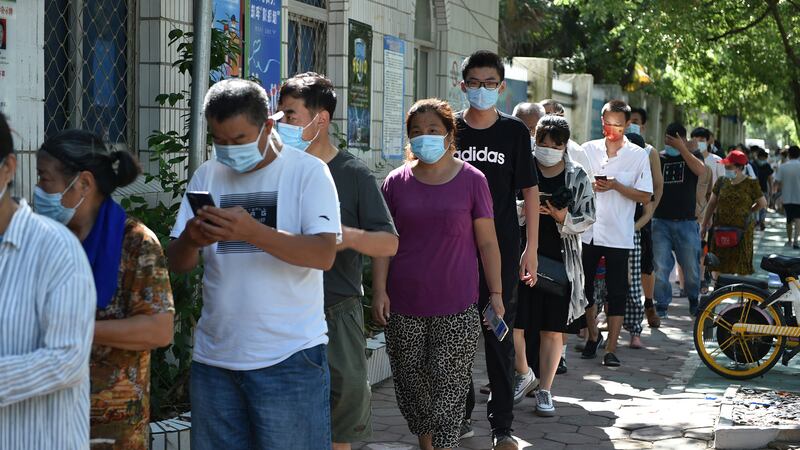
China’s Covid Outbreak Linked to Delta Variant Weighs on Economy
The worst Covid-19 outbreak in China since the beginning of the pandemic has fuelled concerns over an economic slowdown in the country. The spread of the highly transmissible Delta variant has prompted a strict response from authorities, including mass testing and travel restrictions. The outbreak presents another challenge to China’s economy. Goldman Sachs has downgraded its expectations for real gross domestic product growth over the third quarter to 2.3 percent quarter on quarter, compared with 5.8 percent previously. (Financial Times)
China’s Factory-Gate Price Growth Quickened in July, Exceeds Expectations
The producer price index (PPI), which reflects the prices that factories charge wholesalers for their products, rose by 9 percent in July from a year earlier, the National Bureau of Statistics said. The rise was greater than analysts expected and adds to headwinds that could dampen China’s economic growth. (South China Morning Post)
Compiled by Darcey Sergison
China Decoded wants to hear from you. Send tips, suggestions, complaints and compliments to our Shanghai-based Asia Correspondent casey.hall@businessoffashion.co
With consumers tightening their belts in China, the battle between global fast fashion brands and local high street giants has intensified.
Investors are bracing for a steep slowdown in luxury sales when luxury companies report their first quarter results, reflecting lacklustre Chinese demand.
The French beauty giant’s two latest deals are part of a wider M&A push by global players to capture a larger slice of the China market, targeting buzzy high-end brands that offer products with distinctive Chinese elements.
Post-Covid spend by US tourists in Europe has surged past 2019 levels. Chinese travellers, by contrast, have largely favoured domestic and regional destinations like Hong Kong, Singapore and Japan.